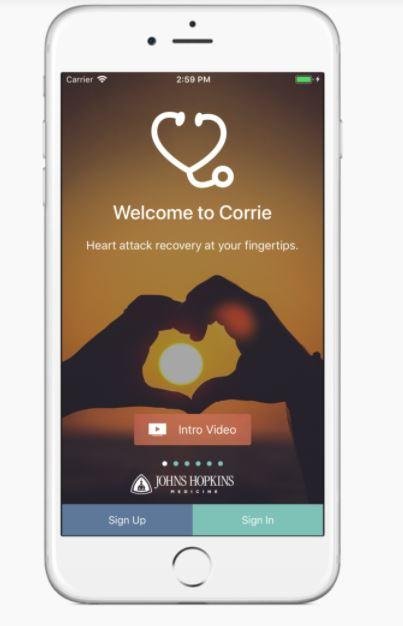Johns Hopkins Health has developed the Corrie app for the iPhone to help patients track medications, follow-up appointments and lifestyle changes. Photo courtesy of Johns Hopkins Health
Feb. 23 (UPI) -- A smartphone app developed at John Hopkins is effective at reducing hospital readmissions of heart attack patients, according to a study by the healthcare system.
The benefits of the Corrie app, made for the iPhone, were explained Thursday at the American College of Cardiology's Cardiovascular Summit in Las Vegas. The conference, with more than 400 cardiovascular colleagues, began Thursday and ends Saturday.
The Corrie app, which is the first cardiology app built using the Apple CareKit platform, helps patients navigate their healthcare in the hospital and after discharge, including keeping track of medications, follow-up appointments and lifestyle changes needed after a heart attack.
"Many heart attack patients are started on new medications in the hospital," Yang said. "This app helps them keep track of all their medications, including how much to take and at what time. They may suddenly have new doctors and more medical visits, including cardiac rehab, and the app helps them track and centralize all those appointments."
The app, which syncs with the Apple Watch and a Bluetooth blood pressure monitor, as well as the iPhone, is being used at Johns Hopkins medical facilities. Corrie is a derivation of Cor, which is Latin for heart.
"We think this is a readily scalable program," lead author Dr. William Yang, a resident in internal medicine at Johns Hopkins University, said in a press release. "We're already working with several other hospitals who are very interested in bringing 'Corrie' to their institutions."
Researchers studied 60 heart attack patients hospitalized at Johns Hopkins Hospital and Johns Hopkins Bayview Medical Center. They agreed to use the app in the hospital and for 30 days after discharge.
Of the participants, 3 percent were readmitted for any reason within 30 days, compared with 19 percent of all heart attack patients at Johns Hopkins.
The researchers calculated a cost savings of $262,500 in readmission penalties because the hospital does not receive Medicare reimbursement for patients readmitted within 30 days.
"We have found there are many gaps in care in patients recovering from a heart attack," Yang said. "We wanted to engage patients in their own care, and help them transition from the hospital to home using existing technology."
The app works in conjunction with the Apple Watch to monitor heart rate and keep track of how much they are walking and with a Bluetooth blood pressure monitor.
Yang said the app was useful to patients while in the hospital. He noted two patients using Corrie asked about stent cards after seeing them mentioned on the app and asked for one. These cards, which display information about stents, are useful if the patient is treated at another hospital with his or her patient's medical records. Patients can take a picture of their stent card, insurance card and other important medical information, and store it on the app.
The researchers have updated the app since Dr. Francoise Marvel developed the app as a resident in 2014 with support from Johns Hopkins Technology Ventures and grants.
"In an earlier version, each medication reminder popped up separately, but patients who had to take a number of medications at the same time said that was overwhelming," Yang said. "So, we changed it, and now patients receive one notification for all the medications they need to take at the same time."















